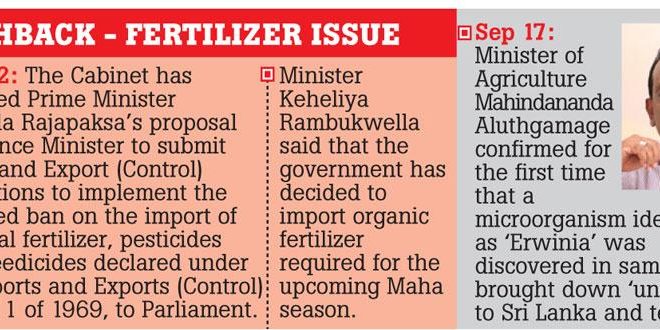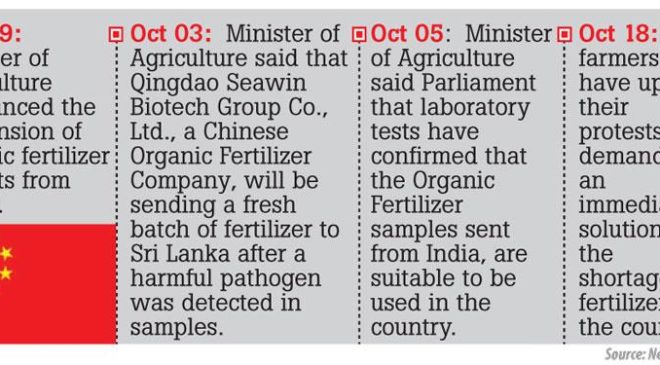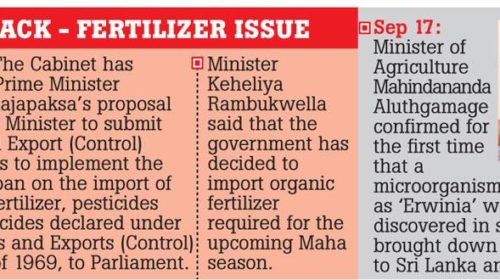From farmers’ agitation to commercial dispute with China
( By Kelum Bandara – Daily Mirror)
 The government decided, all of a sudden, to implement organic farming in place of chemical agriculture which Sri Lankan farmers are accustomed to for nearly 60 years. President Gotabaya Rajapaksa is pledge-bound to introduce eco-friendly agriculture in steps over a decade according to his manifesto ‘Vistas of Prosperity and Splendour’. Despite the policy envisaged in the manifesto, the government took a hasty move to ban chemical farming ahead of four months for the Maha season (main cultivation season). The decision triggered a crisis of epic proportion in the farming sector with rice growers agitating in the main agricultural districts. Today, in some areas, the fields which should normally look lush with rice paddy remain abandoned since farmers fear cultivation of them due to uncertainty over lack of fertilizer.
The government decided, all of a sudden, to implement organic farming in place of chemical agriculture which Sri Lankan farmers are accustomed to for nearly 60 years. President Gotabaya Rajapaksa is pledge-bound to introduce eco-friendly agriculture in steps over a decade according to his manifesto ‘Vistas of Prosperity and Splendour’. Despite the policy envisaged in the manifesto, the government took a hasty move to ban chemical farming ahead of four months for the Maha season (main cultivation season). The decision triggered a crisis of epic proportion in the farming sector with rice growers agitating in the main agricultural districts. Today, in some areas, the fields which should normally look lush with rice paddy remain abandoned since farmers fear cultivation of them due to uncertainty over lack of fertilizer.
 The government airlifted a stock of Nano liquid fertilizer from India to be sprayed on crop plants in the absence of Urea chemicals as a source of nitrogen for plant growth. But, things are yet to settle in the farming community.
The government airlifted a stock of Nano liquid fertilizer from India to be sprayed on crop plants in the absence of Urea chemicals as a source of nitrogen for plant growth. But, things are yet to settle in the farming community.
It is all too obvious that farmers ‘unrest is fueled by the opposition – Samagi Jana Balawegaya (SJB) and Janatha Vimukthi Peranuna (JVP) which seek to seize the political momentum for their electoral ends. That is a natural phenomenon in a multi-party democracy. In such a setup, be it whatever party, the opposition always tries to outdo the governing party. As such, there is no point in laying blame on the opposition over farmers’ agitation. Tension is common. The opposition can only fuel and take it to new heights, maybe, through media stunts.
The government only paved the way for it by initiation of action overnight for the introduction of organic farming, a process that requires meticulous planning and long term for implementation otherwise. It involves education of farmers, training of them in the use of organic fertilizer. It is a transformation to be achieved in the span of at least three to five years. Secretary to the Agriculture Ministry Prof. Udith K. Jayasinghe himself admitted that the cancellation of the import of chemical agro inputs was an ill-advised move.
In addition to tension among farmers against the government, a commercial dispute is likely to crop up with China in the rush for the import of organic fertilizer.
Subsequent to the adoption of green agriculture policy by the government in May, this year, the government selected Qingdao Seawin Biotech Group Company Ltd., after a bidding process.
Sri Lanka plant quarantine authorities which tested samples provided by the company detected Erwinia, a harmful bacteria. Detection made headlines in mainstream and social media leading to the call for termination of the deal with the Chinese company. However, the Chinese company has now disputed findings by the Sri Lankan plant quarantine authorities saying that testing done here was not up to the mark in terms of international standards.
The company, through the Chinese embassy in Colombo, issued a statement on Tuesday (October 26) asking for reference of samples to be tested by an independent third party.
The statement says, “It was officially listed as a qualified supplier for Tender No. IFB No. SMOF/OFPR/2021/1 on August 11, to supply 99,000 tons of organic fertilizer to Sri Lanka. Course of this event after awarded the tender, Qingdao Seawin Biotech Group signed contracts with the buyers through a local biding agent in Sri Lanka, and strictly fulfilled the contract. It overcame many difficulties, such as busy international and domestic orders, soaring global raw material prices, tight shipping schedules and berthing slot, high sea freight cost and so on, and gave priority to ensure the production and delivery of the tender contract for Sri Lanka. After the buyer issued Letter of Credit (L/C), Qingdao Seawin Biotech Group shipped the organic fertilizer which comply with the quality requirements on September 23 according to the time schedule required by L/C (before September 25). While the goods were on the way by sea, CFC informed that “the import permit has not been obtained” and “the goods will be rejected”. However, according to international trade practices, it is the buyer’s obligation to obtain the import permit. The failure to obtain the import permit is caused by the buyer’s mistakes and negative inaction. On September 23, Sri Lanka NPQ received the seller’s product samples. On September 27, the seller received an oral notice from the buyer and was informed that Sri Lanka Plant Quarantine Center (NPQ) issued a conclusion of “suspecting that the samples contain Erwinia”, but did not provide the test report, test method and standards.
According to ISPM27 rule in IPPC (International Plant Protection Convention), it will take more than six days to identify Erwinia, but NPQ only takes three days to draw a “suspicious” conclusion. After the supplier raised doubts, NPQ Sri Lanka updated the report on October 11. Seven days was used to test, but it still did not indicate the test standards and methods. Testing temperature of Erwinia shown in the report is 37, and carrot slices at 37 are used for pathogenicity test. According to the relevant agreement of IPPC, the testing temperature of Erwinia is 25, and healthy plants should be used for pathogenicity test. At least 13~14 days should be used to confirm Erwinia through pathogenicity. The unscientific detection method and conclusion of NPQ in Sri Lanka obviously do not comply with international animal and plant quarantine convention,”
In the same statement, the company insisted that the product samples passed the test of Schutter Group, a third-party international testing organization designated by the buyer (SLSI) and passed the export plant sustainable development of green agriculture.
Nevertheless, the Sri Lankan side vows for accuracy of their test reports. The issue has also been politicized in Sri Lanka with the parties in the opposition – SJB and JVP protesting against the delivery of shipment into the country. Now the Chinese side has called for reference of the matter to another third party testing organization- Swiss SGS group) in this instance.
According to the tone and tenor of the language used in this press release, the Chinese side has taken a hard and fast position. The embassy’s involvement shows how serious they are in this matter. The Foreign Ministries of the two countries are not involved in this dispute. Sri Lankan embassy is kept informed of what is happening, but it is not involved in the problem, according to informed sources. According to all indications, it will lead in the direction of a commercial dispute with the Chinese company unless Sri Lanka agrees to certification of fertilizer samples by a third party.
Again, the problem emerged because of the lack of professionalism in dealing with international transactions.




Рекомендуем вам онлайн курсы 9 класс математика огэ
Рекомендую – Аренда автомобилей без водителя в СПБ
Рекомендую leebet casino
Рекомендую – селектор казино сайт
Рекомендую сайты: fotonons.ru, artcet.ru, 40-ka.ru, urkarl.ru, upsskirt.ru, yarus-kkt.ru, cultureinthecity.ru, imgtube.ru, great-galaxy.ru, shvejnye.ru, lostfiilmtv.ru, voenoboz.ru, my-caffe.ru, kanunnikovao.ru, adventime.ru, kaizen-tmz.ru
https://yarus-kkt.ru/
https://shvejnye.ru/
https://krylslova.ru/
кейтеринг Орск
каналы телеграм каталог лучших каналов
реферат по физкультуре
Также рекомендую вам почитать по теме – https://noviy-status.ru .
И еще вот – https://oleant.ru .
лучшие эхолоты для рыбалки с лодки